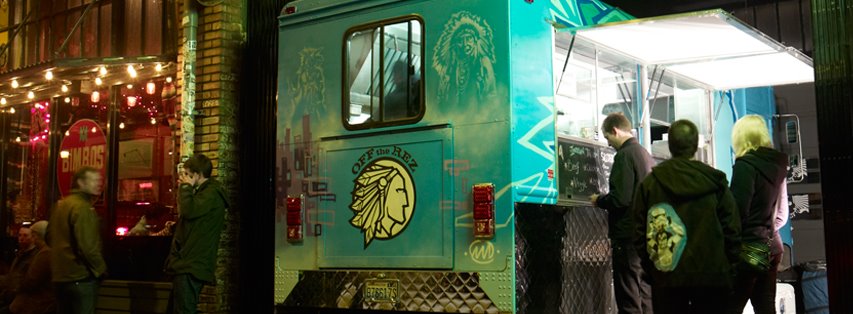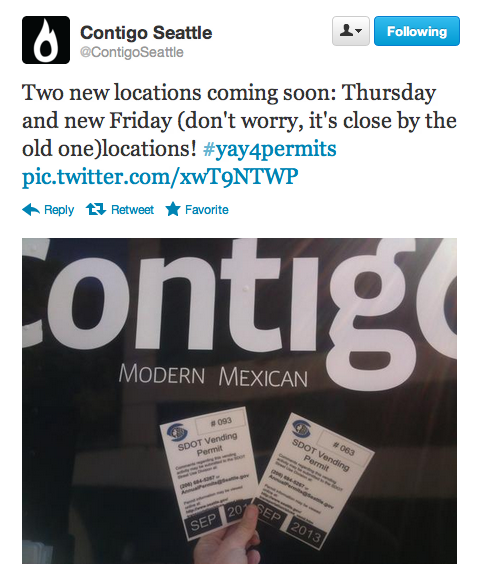 Off the Rez has worked it out on E Pike (Image: Off the Rez via Facebook)
Off the Rez has worked it out on E Pike (Image: Off the Rez via Facebook)
With Capitol Hill’s growing nightlife economy, one component of the scene that hasn’t grown to the same extent as the lines outside Pike/Pine clubs on a Friday night is that necessity of booze-y late-night carousing — street food. Answers have been mixed as Seattle reaches its first anniversary of enacting new laws designed to foster the entrepreneurial food+drink scene. Are things better? The party crowd at the Puget Sound Business Journal says, ho ho, Seattle street food is gaining speed. Slog says “yes and no.” The Great Broadway/Pike Hot Dog Cart Caper of 2012 says the city, at least on Capitol Hill, still has plenty of work to do.
Last year, the City Council passed legislation beefing up street food enforcement, while simultaneously easing regulations. The intent was to make vendors feel more welcome while also providing strictly enforced guidelines.
According to Erik Gus of Contigo, a food truck that specializes in modern Mexican cuisine, everyone is learning what the relatively new street food policy means.
Gus ran into trouble with the city when his permit for a spot at 11th Ave and Pike was taken away due to a miscalculation that placed the cart too close to a restaurant.
“I keep a tape measure in my car now,” Gus said.
“The city is learning just as much as we are about the codes, we’re all learning.”
One of the trickier policies for vendors requires the securing of a bathroom within 200 feet of the location.
“We’ve talked to businesses before and agreed to cook them free lunch in exchange for use of the bathroom. Some people just ask us to pay them for it. The bathroom agreement is hard to set up sometimes,” Gus said.
Exactly what a number of the policies are asking for is difficult to discern for some street food entrepreneurs.
“It’s a lot of homework and a lot of grey area,” Mark McConnell from Off the Rez said. “A lot of things are unclear.”
Despite all the shuffle, Gus said things have been mostly positive with the city.
 Permits — worthy of celebration (Image: Contigo via Twitter)
Permits — worthy of celebration (Image: Contigo via Twitter)
“The city has been really great and accommodating — getting permits is just like any other process, if you’re prepared you’re fine.”
DPD Service Request #40571
“In the 80s up until somewhat recently, street food was considered something of a blight on the city,” DPD’s Gary Johnson said. “As we became a much more urbanized and cosmopolitan city, Seattle was noted for its lack of a vibrant street food scene.”
Johnson said at the same time street cart vendors doling out simple fare like hot dogs popped up all over the city, with one of the healthiest populations residing in the Pike/Pine corridor.
“We had very limited enforcement capability. Most vending that was happening was illegal,” Johnson said.
Which brings us to DPD Service Request #40571 — a story of how the new rules work and don’t work and the challenges faced by vendors trying to find a spot in the neighborhood.
“There is an unmarked hot dog vending truck which sells hot dogs to the drunk and drunker from the parking lot corner of the Shell gas station, located at Broadway and E. Pike,” begins an anonymous Cap Hillian’s complaint, filed with the Department of Planning and development earlier this year.
“The truck’s very, very close proximity to my apartment, and its unreasonable hours, coupled with the crowd noise, the smell of gas which permeates my apartment from their open gas flames, is why I need your help.”
The anonymous resident goes on to explain that the owner of the Shell gas station said he “didn’t know anything” about the hot dog truck. After some prodding, the owner broke down, ending the conversation with the tried and true “It’s my private property and I can do what I want” line.
According to city records, inspector Tom Bradrick was put on the case, which ended up generating “a lot of discussion with management, senior inspectors, and land use specialists,” according to one of the more straightforward remarks we’ve ever seen in the DPD complaint records.
The things is, techincally, the Shell owner was right. Kind of. Chances are, if you read an article about a new housing developments in the neighborhood on CHS, you’ll notice that they are sitting on top of retail space, being built around retail space, or putting new retail space in under the housing. Design-wise, we mix private and public space. That’s what made this complaint so tricky for DPD. The hot dog cart is technically in commercial space, but someone also lives right next door.
The email chain the complaint started internally at DPD bounces back and forth between most experts in the department. As Inspector Bradrick said, the whole gang got involved, “management, senior inspectors, and land use specialists.”
Ultimately, the cart was determined not to have breached any policy — but the email chain shows that reaching a verdict on street food policy in the city is still just as messy as a Seattle dog at last call.
Connections
Back on E Pike, Off the Rez has had an easier time of it.
“We figured out everything beforehand — bugged inspectors ahead of time to make sure we had things in order and flew through the inspection,” McConnell said.
Mark’s brother is Mike McConnell, founder of Caffe Vita, which made securing Off the Rez’s spot in the cafe’s Pike St loading dock easy. McConnell’s truck is on private property and has permission of the owner, allowing Off the Rez to bypass most of the city’s new permit process. Thanks to the city’s new code and a vital E Pike connection, Off the Rez has flourished on Capitol Hill and on its weekly visits to Fremont and South Lake Union. McConnell said he hopes to open a brick and mortar restaurant version of Off the Rez in the future.
The DPD mail thread



Portland has a much more robust food truck scene. Why aren’t we trying to learn from them? Or incorporate their best practices into our codes?
Portland has the benefit of having all of these empty parking lots around town (since more and more Portlanders are biking and bussing) that are now food truck pods. Most of their food trucks stay at in the pods all year round. Ours are mobile. That alone makes a huge difference.
I think that once again, Seattle is missing the boat on helping a segment of the entreprenurial population thrive, which would help boost local economy. I’m from the NYC area, which is known for it’s street food scene. I looked into setting something up here, but on further inspection of the hoops one needs to navigate, decided against it. The city needs to revisit some of the regulations like the 200 foot rule, which I think is absurd, and a bit of paranoia on the part of restaurant owners. I’m keeping an eye on things to see if the city eases up, until then, we’re focusing on a much more attainable goal of opening a brick & mortar cafe, which would be backwards in any other city except Seattle.
I’m curious where the residential units are that are so close that they’d smell the gas from the hot dog stand at the Shell station. Also, wouldn’t you also smell gas and have noise from, you know, the operations of a gas station.
I’ve lived in other cities with a much more robust street food scene – the problem with Seattle is that the City regs kowtow to the paranoia of bricks-and-mortar restaurant owners, who don’t want to have to face competition.
I live above the aforementioned hot dog truck! The noise/smell of the Shell station is nothing, really, compared to the truck’s noise/smell, and seemingly odd addition of an open gas flame at a gas station, and drunken screamers planted in the same spot, rather than walking past, at 3-4 a.m.! I do wish the vendor of the hot dog truck, and all street-food vendors, success. The truck COULD move to the other side of the Shell station lot, but that location would put their open-gas flame a few feet too close to the gas pumps!!! The truck also is dependent upon the gas station for an electrical outlet to run their power, and investment in a longer power cord is, apparently, not an option.
Interesting – I assume above that music store and ballet? I didn’t know there were occupied apartments there. I could see how the smell of propane all night and drunks would get annoying.
I’m from Chicago. I have accepted that I now live in a small town. I think people are confused and think that Seattle is a big city. People in big cities are used to hustle and bustle. Living on Cap Hill means noise, different kinds of odors and aromas, foot and mobile traffic…i.e. diversity. People want to live in the middle of it all, but don’t want to be bothered by it when they’re at home. Guess what? This is your home…you can’t have it both ways. Don’t say that, “I wish the truck vendors success” in the same breath as “…but I wish they would move to another location”. St. Louis, MO, made their downtown area strictly a business district–no residential zoning. The district failed, stores closed, and businesses failed. If you want to be in a strictly residential area, then move to Magnolia or Beacon Hill or the suburbs.
(Please note that I typed this message while I was standing on my “I’m-from-a-big-city” soap box which I usually leave at home…in Chicago.) Thank you for your time.